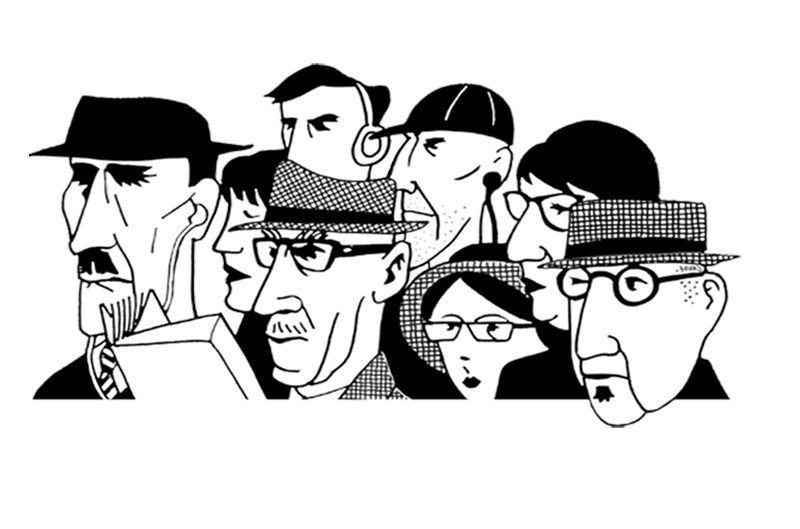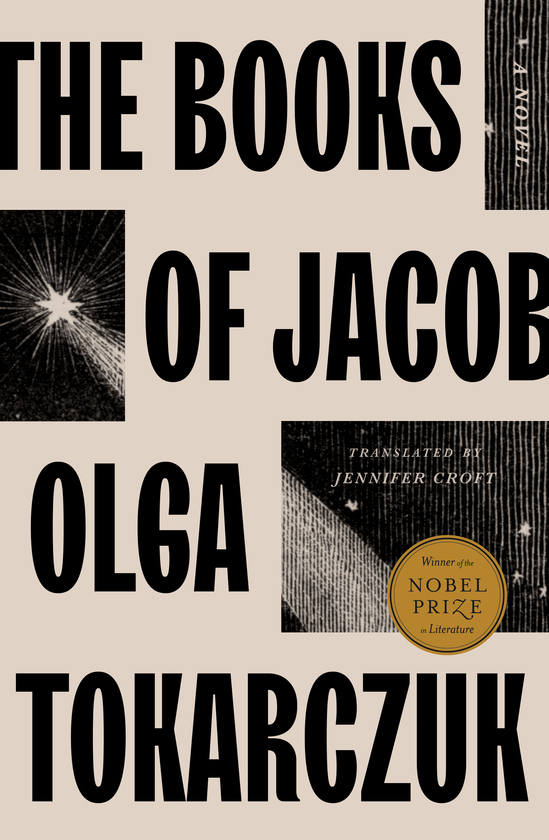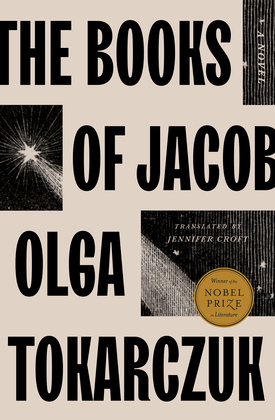The Books of Jacob
Olga Tokarczuk
Translated by Jennifer Croft
The Nobel Prize-winner Olga Tokarczuk’s richest and most ambitious novel yet follows the comet-like rise and fall of a messianic religious leader as he blazes his way across eighteenth-century Europe.
As new ideas—and a new unrest—begin to sweep the Continent, a young Jew of mysterious origins arrives in a village in Poland. Visited by what seem to be ecstatic experiences, Jacob Frank casts a spell that attracts a fervent following. He reinvents himself again and again, converts to Islam, then Catholicism, is pilloried as a heretic, revered as the Messiah, and wreaks havoc on the conventional order, Jewish and Christian alike, with scandalous rumours of his sect’s secret rituals and the spread of his iconoclastic beliefs.
The story of Frank—a real historical figure, a divisive yet charismatic man—is the perfect canvas for the genius and unparalleled reach of Olga Tokarczuk. Narrated through the perspectives of his contemporaries—those who revere him, those who revile him, the friend who betrays him, the lone woman who sees him for what he is—The Books of Jacob captures a world on the cusp of precipitous change, searching for certainty and longing for transcendence.
INTERVIEWS and REVIEWS
Australian ($)
AV Club
Conversation
Guardian
Hadassah Magazine
Happy magazine
Jewish Telegraphic Agency
London Review of Books
Monthly
New York Times
Oprah Daily: The 50 Most Anticipated Books of 2022 (#15)
Prospect magazine
Seattle Times
Shelf Awareness
The Times ($)
Viva: Book Club: Get Lost In The Best Summer Reads For 2021
Vulture: 49 Books We Can’t Wait to Read in 2022
World Literature Today
andThe Books of Jacob
‘A magnificent writer.’
‘Olga Tokarczuk is a masterful storyteller who challenges expectations of what a story can be.’
‘As for Ms. Tokarczuk, there’s no doubt: She’s a gifted, original writer, and the appearance of her novels in English is a welcome development.’
‘One among a very few signal European novelists of the past quarter-century.’
‘It is hard to imagine a more perfect pairing of writer and subject: Frank is complex, contradictory, his presence at once all-consuming and impossible to pin down; Tokarczuk is brilliant, sensitive, encyclopaedic, like a writer dreamed of by Borges. Together with Croft they form a kind of trinity, three figures combining to form one indivisible body.’
‘Impressively sprawling story… With language that’s engaging, erudite, and spiced with witty colloquialisms and wonderful turns of phrase via Jennifer Croft’s supple translation, Tokarczuk explores the state of being an outsider in places with fixed cultural boundaries…A wealth of fine quotidian detail and brilliantly connected narrative threads draw the reader in. With its length, dozens of characters, and theological discussions, Tokarczuk’s panoramic tale requires commitment, but it is masterful.’
‘Tokarczuk shows impressive skill in recreating an entire era and world, which ranges from Poland to Smyrna and Vienna. Yet her real genius lies in the cast of characters she has conjured up; dozens, each fully realised, from an emperor downwards…She is also ambitious in her willingness to ask (and sometimes answer) extraordinarily large questions through these character studies…Holding it all together for 900 pages is incredible, but that is not what makes this book great. Tokarczuk, unafraid and ambitious, creates a very fallible messiah, yet makes it seem reasonable and human to believe in his divinity. That is a kind of literary miracle.’
‘In Tokarczuk’s telling this epic of myth and history is a celebration of cultural diversity, a plea for tolerance and—notwithstanding its impeccably researched historical setting—a contemporary story of borders, refugees and migration…Tokarczuk’s determination in this tremendous work to recast and restore to Poland’s past its vanished Jewish culture has never been more necessary.’
‘Nobel laureate Olga Tokarczuk has made an incredible return with The Books of Jacob. The ambition of this novel is striking, its narrative structure complex as we trace the tale of the divisive figure of Jacob Frank — a real-life religious chameleon who exerts a terrifying power over his disciples. A demanding, yet breathtaking read, told from a range of perspectives.’
‘[In] Jennifer Croft’s beautiful, lithe translation…Tokarczuk tells the story of [Jacob] Frank by ingeniously interweaving narrators both reliable and unreliable—and it is here that The Books of Jacob spreads its majestic wings and lifts from fact into fiction…In each of her books, Tokarczuk approaches a subject from the periphery, as though she too were a foreigner. The Books of Jacob [is] her masterpiece.’
‘[A] visionary novel … Tokarczuk is wrestling with the biggest philosophical themes: the purpose of life on earth, the nature of religion, the possibility of redemption, the fraught and terrible history of eastern European Jewry. With its formidable insistence on rendering an alien world with as much detail as possible, the novel reminded me at times of Paradise Lost. The vividness with which it’s done is amazing. At a micro-level, she sees things with a poetic freshness…. The Books of Jacob, which is so demanding and yet has so much to say about the issues that rack our times, will be a landmark in the life of any reader with the appetite to tackle it.’
‘The Books of Jacob is a spellbinding epic, one of the great literary achievements of the decade: a poetically brimful recreation of the world of a Jewish false messiah in 18th-century Poland, but beyond as well to mystically drawn priests and errant aristocrats. Charged with a sensuous immediacy it’s the kind of hypnotic novel you not so much read as dwell in, and which then, magically, comes to dwell in you.’
‘A panorama of early Enlightenment Europe that doubles as an open-minded study in the mysteries of charisma, it is perhaps above all – and aptly – a gargantuan act of faith, a novel in which your reading has barely begun by the time you’ve turned the last of its 900 pages.’
‘That many of the events Tokarczuk narrates are derived from historical sources is fascinating but essentially unimportant. What matters is the internal coherence of the world she creates through language and her ability to guide us through examinations of limitless faith and human failings; cultural identity and the ostracism of the other; the manipulation of the steadfast and the thoughtless cruelty of friends. Above all, she shows us our enduring search for meaning. This extraordinary novel is part of that search.’
‘Olga Tokarczuk is inspired by maps and a perspective from above, which tends to make her microcosmos a mirror of macrocosmos. She constructs her novels in a tension between cultural opposites: nature versus culture, reason versus madness, male versus female, home versus alienation. Her magnum opus so far is the historical novel The Books of Jacob, portraying the eighteenth-century mystic and sect leader Jacob Frank. The work also gives us a remarkably rich panorama of an almost neglected chapter in European history.—
‘A writer on the level of W. G. Sebald.’
‘Prodigious … an impressive novel … combining immense erudition to writing that is as fluid as it is poetic, Tokarczuk brings to life, over the course of a thousand pages, the epic story of a messianic group in a multicultural Poland.’
‘A literary-philosophical masterpiece’
‘Can you write a 900-page novel that keeps you in suspense? Olga Tokarczuk succeeded.’
‘Magnificent’
‘Nobel laureate Tokarczuk’s subtle and sensuous masterpiece…Readers are rewarded throughout with tender and ebullient moments…In the hands of Tokarczuk and Croft, these concerns feel real and vital—the result of Tokarczuk’s deep investment in her material. This visionary work will undoubtedly be read and talked about by lovers of literature for years to come.’
‘The book (which has been beautifully translated into English by Croft) has been widely hailed as Tokarczuk’s magnum opus, and it will likely take years, if not decades, to begin to unravel its rich complexities. A massive achievement that will intrigue and baffle readers for years to come.’
‘[A] supreme feat in novel writing that was influential in [Tokarczuk] winning the 2018 Nobel prize in literature…The Books of Jacob is an historical epic that never stumbles or meanders…The novel uses many forms, including letters, journal entries, drawings and digressional episodes, to lend the narrative its exuberance.’
‘Madly ambitious…[A] rich tale that is a towering black comedy to be treasured.’
‘The Books of Jacob takes its place alongside the great postmodern meganovels, Pynchon and Life: A User’s Manual, García Márquez and 2666 … Olga Tokarczuk has learned to do the impossible: to write the novel of the collective.’
‘This is a big book. Big by weight, but also laden with ideas on every one of its many pages…Every second invested in this epic novel will be worthwhile’
‘The Books of Jacob does not offer clear-cut answers to big philosophical questions, but it certainly gives us a starting point from which to consider these questions…The Books of Jacob itself is a precisely crafted work that skilfully experiments with form, while not losing sight of developing a narrative that keeps the reader hooked until the end.’
‘The expansiveness of the story…feels like a heroic act of homage, recuperation, and mourning…What Togarczuk seeks to achieve in these pages is to mend the holes in the fabric of history – to use words to find a proper meaning in the world and establish its underlying accordance.’
‘A massive achievement that will intrigue and baffle readers for years to come.’
‘The Polish Nobel laureate produces a daunting but unforgettable magnum opus with this awesome feat of historical imagination. In a crystalline translation by Jennifer Croft, Olga Tokarczuk’s epic depicts the messianic fervor of 18th-century Eastern Europe with preternaturally cool and capacious intelligence.’









